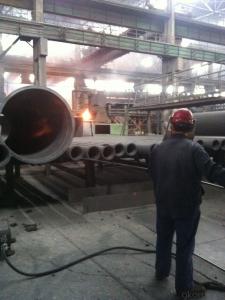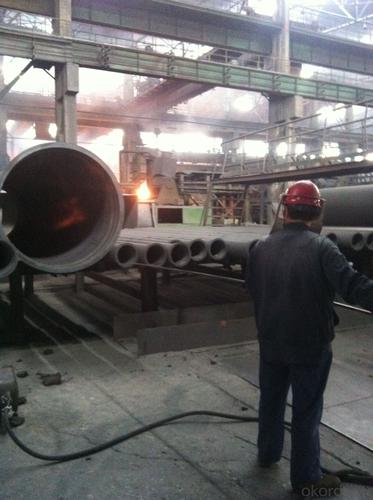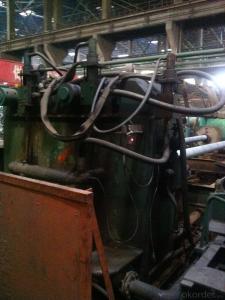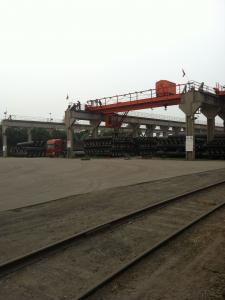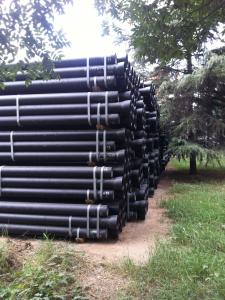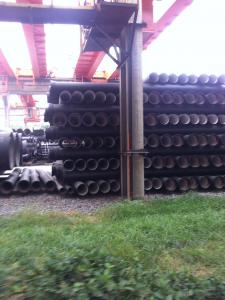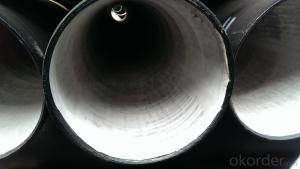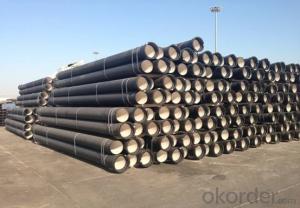DUCTILE IRON PIPES AND PIPE FITTINGS K9 CLASS DN1000
- Loading Port:
- Tianjin
- Payment Terms:
- TT OR LC
- Min Order Qty:
- 22 pc
- Supply Capability:
- 3000 pc/month
OKorder Service Pledge
OKorder Financial Service
You Might Also Like
Material : Ductile Cast Iron
Size Range : DN 80mm to DN 2000mm
Unit Effective Length : 6m or 5.7m
Manufacture Standard: ISO 2531:1998/ EN 545:2006/EN 598:2007
Annual capacity : 200,000 tons
Coating Exterior: Zinc 130g/m2 according to ISO 8179-1 and bitumen coating 70 microns.
Cement Interior: Portland Cement/ High Alumina Cement/ Sulphate Resisting Cement Lining according to ISO 4179
Special requirements on external coating and internal lining can be applied
We also provide accessories such as SBR/EPDM rubber gaskets, lubricant paste, pipe caps, PE sleeves, etc.
Additional Parts:
Each pipe is strictly inspected according to related standard to ensure permanently high performance.
Easy Installation at site and service free for life
Long Service Lifespan
Quotation will arrive you within 24hours once we get your inquiry.
We guarantee offering you a competitive price.
A copy of original inspection reports of pipes will be offered after shipment.
Photos of loading process will be sent to the customer after shipment effect.
We will follow-up the delivery progress after shipment effect and update to the customer on weekly basis.
- Q: Can ductile iron pipes be used for irrigation of sports fields?
- Yes, ductile iron pipes can be used for irrigation of sports fields. Ductile iron pipes are known for their durability, strength, and corrosion resistance, making them suitable for various applications, including irrigation. They can effectively transport water over long distances and withstand the pressure required for irrigation systems. Additionally, ductile iron pipes have a long lifespan, reducing the need for frequent replacements and ensuring reliable irrigation for sports fields.
- Q: Can ductile iron pipes be made into clear tubes?
- Of course, the cast iron pipe is suitable for being buried in the ground because of its corrosion resistance, rust resistance and non deformation.
- Q: How do ductile iron pipes perform in extreme weather conditions?
- Ductile iron pipes are renowned for their outstanding performance when faced with harsh weather conditions. Crafted from an iron alloy infused with small quantities of carbon and other elements, these pipes exhibit unparalleled strength and resilience, rendering them highly impervious to the effects of extreme weather. In soaring temperatures, ductile iron pipes maintain their structural integrity without succumbing to softening or deformation, unlike certain other materials. This ensures that the pipes continue to function optimally and reliably, even in scorching heat. Furthermore, these pipes boast a remarkable resistance to thermal expansion, thereby minimizing the risk of pipe distortion or joint failure during temperature fluctuations. When confronted with frigid conditions, ductile iron pipes also excel. They possess a low coefficient of thermal expansion, translating to a reduced likelihood of cracking or fracturing due to freezing temperatures. Moreover, their robustness and flexibility enable them to withstand the pressure exerted by freezing water inside the pipes without incurring significant damage. In addition, ductile iron pipes exhibit superb corrosion resistance, demonstrating their ability to withstand the detrimental effects of harsh chemicals, saltwater, and other corrosive substances that may be present in extreme weather conditions. This corrosion resistance ensures the longevity and dependability of the pipes, preventing leaks and preserving water quality. In terms of durability, ductile iron pipes are designed to endure heavy loads and external stresses. Boasting high tensile strength, they display resistance to bending and breakage. This characteristic proves crucial in extreme weather conditions where heavy rainfall, powerful winds, or even seismic activities may occur. All in all, ductile iron pipes have a well-established reputation for delivering exceptional performance in extreme weather conditions. Their strength, resilience, thermal stability, corrosion resistance, and durability render them a reliable choice for a multitude of applications, including water supply, sewage systems, and industrial pipelines, even in the most challenging weather environments.
- Q: Can ductile iron pipe be used for compressed air systems?
- Yes, ductile iron pipe can be used for compressed air systems. Ductile iron pipe is known for its strength, durability, and resistance to cracking, making it suitable for various applications including compressed air systems. It is capable of withstanding high pressure and is less likely to corrode or rust compared to other materials. However, it is important to ensure that the ductile iron pipe is properly sized and installed to handle the specific requirements of the compressed air system. Additionally, regular maintenance and inspection should be conducted to prevent any potential issues or damages.
- Q: Can ductile iron pipes be repaired if damaged?
- If there is any damage to ductile iron pipes, they can indeed be repaired. The process of repairing them involves several steps. Firstly, it is necessary to identify and isolate the damaged section of the pipe. Once this has been accomplished, the damaged portion of the pipe is typically cut out and removed. Subsequently, a new section of pipe is inserted and connected to the existing pipeline using appropriate methods such as welding or mechanical jointing. The repaired section is then tested to guarantee its integrity and functionality. It is important to note that the repair process may vary depending on the extent and nature of the damage. Therefore, it is always advisable to seek advice from professionals who specialize in ductile iron pipe repairs to ensure a proper and effective restoration is achieved.
- Q: What are the different types of valves available for ductile iron pipe?
- There are several different types of valves available for ductile iron pipe, each serving a specific purpose and function. Some of the most common types of valves used with ductile iron pipe include: 1. Gate Valves: These valves are used to either completely open or close the flow of fluid within the pipe. They have a gate-like mechanism that either blocks or allows the passage of fluid when the valve is either fully open or fully closed. 2. Butterfly Valves: Butterfly valves are quarter-turn valves that use a circular disc as the closing mechanism. When the valve is open, the disc is parallel to the flow, allowing for minimal pressure drop. When the valve is closed, the disc is perpendicular to the flow, completely stopping the fluid. 3. Ball Valves: Ball valves have a spherical disc with a hole in the middle, known as a ball. When the valve is open, the ball is positioned in such a way that it allows fluid to flow through the hole. When the valve is closed, the ball is rotated to block the flow. 4. Check Valves: Check valves are designed to allow fluid to flow in one direction only, preventing backflow. They have a flap or a disc that opens when the flow is in the correct direction, and closes to stop the flow when it tries to reverse. 5. Plug Valves: Plug valves have a cylindrical or conical plug with a hole through it that can be rotated to control the flow. When the valve is open, the hole aligns with the pipe, allowing fluid to pass through. When the valve is closed, the hole is perpendicular to the pipe, blocking the flow. 6. Pressure Reducing Valves: These valves are used to control and reduce the pressure of fluid flowing through the pipe. They have a mechanism that adjusts the flow area, allowing for pressure reduction. 7. Pressure Sustaining Valves: Pressure sustaining valves are used to maintain a specific pressure within the pipe. They automatically adjust the flow area to sustain the desired pressure level. 8. Air Release Valves: Air release valves are used to release air trapped within the pipe. They allow air to escape while preventing fluid from leaking out. These are just a few examples of the different types of valves available for ductile iron pipe. The choice of valve depends on the specific application, flow requirements, and desired functionality.
- Q: What is the DN400 installation charge for ductile iron pipes?
- 1. hourly wage or piece wage: refers to the hourly wage and work hours or the work done by the unit price to pay individual labor remuneration.2. prize: refers to the excess labor and increase revenue of remuneration paid to individuals. Such as saving prize, labor competition prize, etc..3. subsidy: refers to compensate workers special or extra labor and other special reasons for the subsidies paid to individuals, and in order to ensure that the impact of inflation on real wages paid to individual price subsidies. Such as mobile construction allowance, special area construction allowance, high temperature (cold) operation, temporary allowance, aerial allowance and so on.
- Q: What is the difference between a PE fire hose and a ductile iron pipe?
- Seamless steel pipe: a pipe with a hollow cross section, used as a conduit for transporting fluids, such as pipelines for transporting petroleum, natural gas, gas, water, and certain solid materials. Compared withsteel and roundsteelinsolid, flexural torsional strength in the same time, the weight is light, is a kind of economic section steel, widely used in the manufacture of structural parts and mechanical parts, such as the oil pipe, automobile transmission shaft, the bicycle frame and steel construction with scaffold with steel pipe manufacturing ring parts can be improved the utilization rate of materials, simplify the manufacturing process, material saving and working hours, has been widely used to manufacture steel tube.
- Q: Can ductile iron pipes be used for gas distribution networks?
- Yes, ductile iron pipes can be used for gas distribution networks.
- Q: Do ductile iron pipes require special maintenance?
- Yes, ductile iron pipes do require special maintenance. While ductile iron is known for its strength and durability, it is still susceptible to certain forms of corrosion. Regular maintenance is necessary to prevent corrosion and prolong the lifespan of the pipes. This maintenance typically includes periodic inspections to check for any signs of corrosion or damage, as well as cleaning and protective coating applications. Additionally, proper handling and installation techniques should be followed to ensure the integrity of the pipes. Regular maintenance and adherence to industry best practices can help prevent leaks, breaks, and other issues, ultimately saving time and money in the long run.
Send your message to us
DUCTILE IRON PIPES AND PIPE FITTINGS K9 CLASS DN1000
- Loading Port:
- Tianjin
- Payment Terms:
- TT OR LC
- Min Order Qty:
- 22 pc
- Supply Capability:
- 3000 pc/month
OKorder Service Pledge
OKorder Financial Service
Similar products
Hot products
Hot Searches
Related keywords
